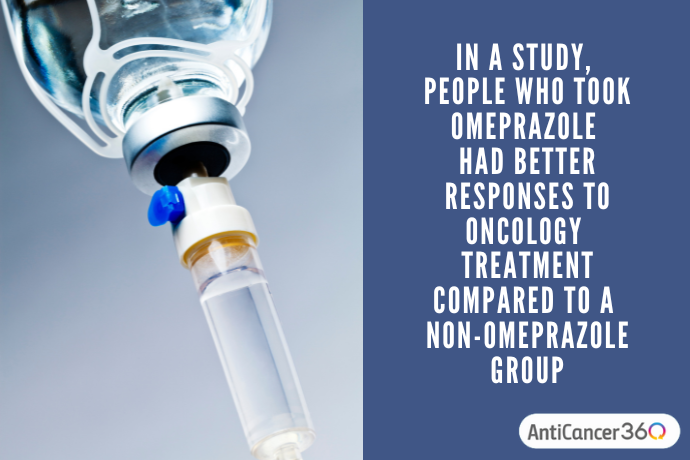When faced with a cancer diagnosis, you want to do everything you can do to both understand the condition and fight it. There are many ways to fight cancer and, hopefully, beat it into remission. There are conventional therapies that most people are familiar with, but there are also additional options to consider especially if your cancer is advanced.
Here at AntiCancer360, we have a series of articles looking at older medications and their excellent potential for new, off-label uses in fighting cancer. We have already reviewed drugs like Ivermectin, Doxycycline, Aspirin, and Metformin.
We explained in depth the variety of potential anti-cancer benefits of each medication. Today’s article is going to focus on a common prescription and over-the-counter medication known as omeprazole otherwise known by its brand name, Prilosec.

Today, we are going to talk about the science behind omeprazole, a common heartburn medication, and how it has potential anticancer benefits. In some cases, omeprazole can be used off-label with chemoradiotherapy to potentially overcome resistance and enhance treatment outcomes. Depending on your personal situation, this may give you a valuable advantage in your fight against cancer.
What is Omeprazole?
Omeprazole is a medication used to treat conditions such as gastroesophageal reflux disease (GERD), erosive esophagitis, and stomach ulcers. It belongs to a class of medications known as proton pump inhibitors (PPI) [1].
Here is a quick summary of basic facts about omeprazole:
- Brand names: Prilosec, PrilosecOTC
- Generic available: Yes
- Drug form: Capsule, tablet, suspension
- Classification: Proton Pump Inhibitor (PPI)
- Status in the U.S.: Prescription (Rx) and Over-The-Counter
- Initial FDA approval: 1989
Omeprazole and other PPIs have been found to exert anticancer effects on gastric cancer cells, B-cell tumors, pancreatic cells, and hepatoblastoma cells. Specifically, studies have suggested that omeprazole causes cancer cell death (apoptosis) and cancer cell breakdown (autophagy). Additionally, PPIs may weaken chemo-resistant tumors when given in conjunction with cytotoxic medications [2].

Let’s take a closer look at omeprazole’s anti-tumor effects.
Potential Anticancer Effects of Omeprazole
Research shows that omeprazole may help fight cancer in a variety of ways. The identified mechanisms include enhancing the chemosensitivity of cancer cells, treating a specific chemotherapeutic side effect, and inhibiting cancer cell migration throughout the body. Let’s dive into the details.
Researchers set out to learn about the effects of omeprazole on chemoradiotherapy efficacy and tumor recurrence for patients suffering from rectal cancer. The standard of care for advanced rectal cancer often involves chemotherapy followed by surgery. For this study, the researchers looked back, retrospectively, into medical data to find patients who received the same chemoradiotherapy and surgery and had also received omeprazole [3].
Certain cancer cells, in particular gastric and colon, are unique in that they have high levels of an enzyme known as V-ATPases, which help the tumor environment stay acidic. The acidic environment leads to a pH-dependent breakdown of the immediate extracellular matrix and encourages tumor invasion and metastasis [4].
Continued abnormal extracellular acidic pH adds to the invasiveness and metastatic behavior of cancer cells [5]. Additionally, the acidic nature of tumor tissue is believed to interfere with cytotoxic drugs. Clinical observations found that the addition of PPI during chemotherapy helped to re-sensitize chemoresistant cancer [6].
PPIs, such as omeprazole, are commonly used to relieve certain side effects of chemotherapy. In addition to targeting the gastric acid pump, PPIs inhibit the activity of V-ATPases [7]. In colorectal cancer, it is reported that PPIs re-sensitize drug-resistant cancer colon adenocarcinomas cell lines to cytotoxic drugs [8].

From this retrospective study, the researchers found that the group who received omeprazole had a good response rate (50.8%) and that rate was significantly increased compared with the non-omeprazole group (30.6%). This result suggested that omeprazole could enhance the sensitivity of rectal cancer to concurrent chemoradiation therapy [9].
Furthermore, this study found that the recurrence rate in those who received greater than 200 milligrams (mg) total of omeprazole during chemoradiotherapy was significantly lower compared to those who received less than a total of 200 mg of omeprazole. (Keep in mind that the typical dose of omeprazole is 20 mg once or twice daily.) Statistical analysis also showed that omeprazole is an “independent and significant predictor of disease-free survival.” [10]
Frequently Asked Questions about Omeprazole: Dosages, Side Effects, and Precautions
Next, we will answer some commonly asked questions about omeprazole.
How and where can I get omeprazole?
In the United States, omeprazole is available by prescription or over-the-counter. If you do need a prescription, you will want to get one from a licensed healthcare provider. Over-the-counter products may be labeled as omeprazole or Prilosec. Be sure to check with your pharmacist if you have any questions.

Is there any evidence to support omeprazole as a cure for cancer?
Unfortunately, there’s no strong evidence that omeprazole can cure cancer. But, several documented case reports in the literature support omeprazole as a repurposed anticancer therapy. Evidence from preclinical studies and small clinical trials have also found anti-cancer benefits.
More research is necessary to determine if there is a survival benefit of adding omeprazole to the treatment of late-stage cancer and, if so, who might benefit.
What is the dosage of omeprazole for cancer?
Since omeprazole isn’t officially indicated for cancer, there is no specific or recommended dosage. Based on the literature reviewed, one study included patients who received omeprazole orally 20 mg at least once daily and/or intravenously at 40 mg daily.
What are the side effects of omeprazole?
Omeprazole may cause the following common side effects:
- Headache
- Abdominal pain
- Diarrhea
- Gas or bloating
- Nausea or vomiting
Can Omeprazole Help in the Fight Against Cancer?
Overall, you can see that there may be potential benefits to adding omeprazole to your anticancer program. And when you’re fighting cancer, you want every possible tool in your toolbelt, such as repurposed or “off-label” drugs, like the ones mentioned at the beginning of the article.
Be sure to discuss omeprazole’s potential benefits and risks with a member of your treatment team. Omeprazole is available as an Rx and over-the-counter drug in the United States.
Ultimately, when using an Aggressive Integrative Approach to cancer, the goal is to fight cancer from every possible direction. This practice includes integrating repurposed medications and natural supplements to fight cancer in an evidence-based, safe way that shouldn’t interfere with your oncology treatment.
How are you approaching your cancer treatments? Are you taking any natural or dietary supplements? Have you tried omeprazole or any other repurposed medicines? Have you made any other lifestyle changes that have made a noticeable difference in your fight against cancer? Please feel free to share your experience or feedback in the comments below!
Are You A Good Candidate For Our Program?
If you’d like to learn more about the AntiCancer360 approach and see if we can help you… please watch our free online webinar to learn more about our approach. Then at the end, you’ll be able to schedule a free call with someone from our team so that we can discuss your case in more detail.
Dr. Andrew Cox is a graduate of the University of Pittsburgh and is part of the AntiCancer360 team as a consultant pharmacist and medical writer. He received his Bachelor’s degree in Biology from Marist College and a Master of Arts in Cell Biology from Villanova University prior to completing his Doctor of Pharmacy at Pitt. He also completed his Masters of Business Administration from the University of Maine. His expertise helps us create safe herbal and supplement combinations and avoid potential drug interactions.
Andrew has been a licensed pharmacist since 2013 with experience in outpatient retail pharmacy, long term acute care, and managed care pharmacy. He is interested in the appropriate utilization of natural substances to effectively prevent and treat cancer in addition to the traditional treatment strategies. He is also interested in the research and the latest findings of the mechanisms by which various natural compounds affect the tumor microenvironment
In his free time, Andrew enjoys traveling, reading, and the Premier League games on the weekends. He resides in Pittsburgh, Pennsylvania with his wife, daughter, and a boxer mix named, Party Martie.







